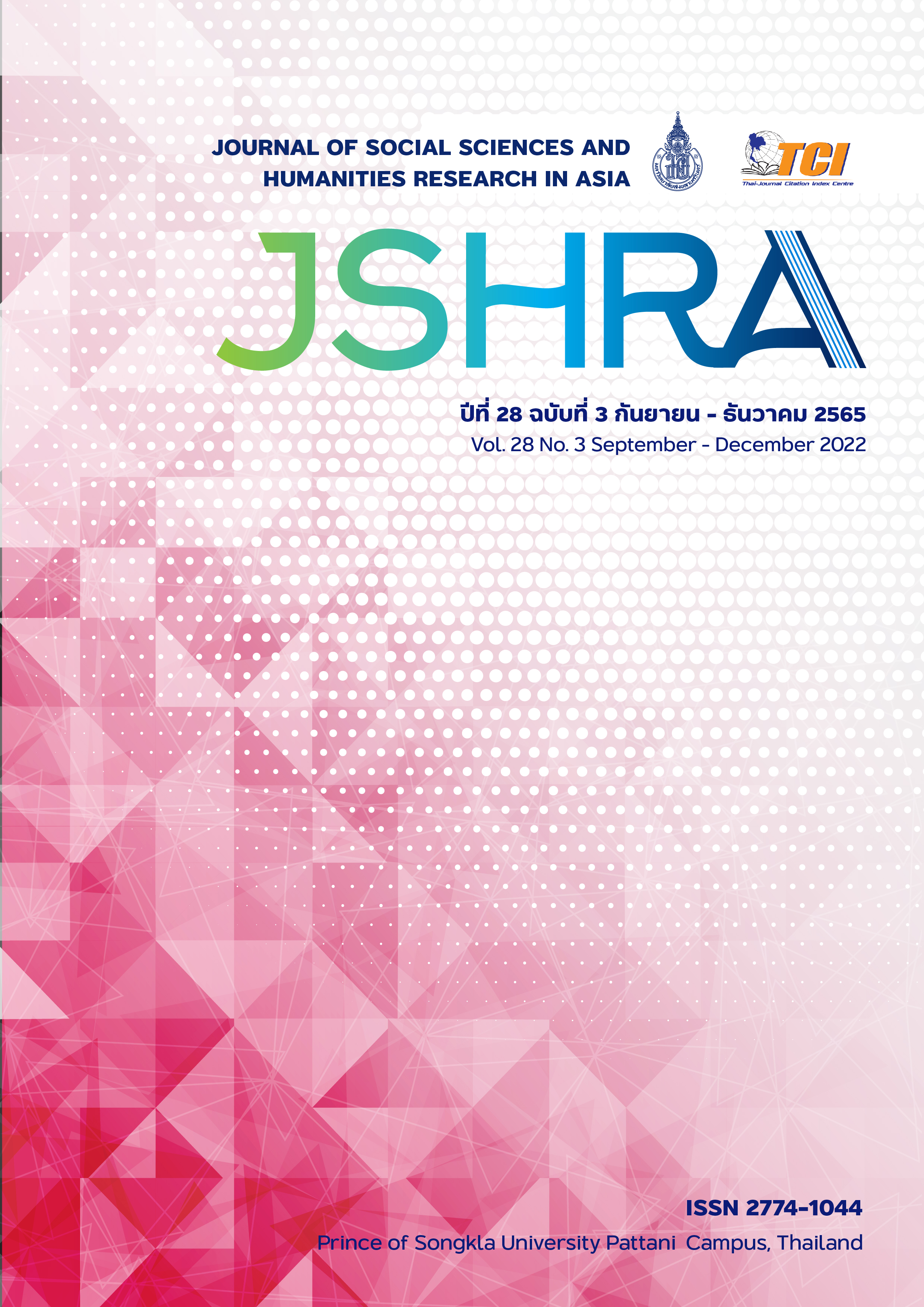A A Survey on Factors of Curriculum and Gender Differences in Learning Performance and Self-Concept of High School Students
Keywords:
social environment, Thai studentsAbstract
The purpose of this research was to survey the effects of social environment factors on students' learning performance and self-concept. This survey research collected data from 100 high school students from two different programs: gifted and ordinary classes of a secondary school in Suratthani Province. Sampling size was calculated by Taro Yamane's formula. It was hypothesized that students from gifted programs would be more affected from social environments due to more challenging curriculum and higher expectations they received from school and families. Data were collected, using online questionnaire adapted from Pekrun and Stephens's (2015) concept of social environment in educational aspects. Reliability of the questionnaire was tested by Chronbach's alpha coefficient method. The data were statistically analyzed, using Wilcoxon Two-sample Test. There was no significant difference between the program curriculums: gifted and ordinary classes. However, it was found that there was significance on student genders. The results revealed that female students were affected more significantly by their social environment than their male counterparts, both in learning performance and in self-concept. Consequently, it is recommended that school administrators pay attention to how social environments affect students, and policies and plans be implemented to assist them in this matter.
References
Boyce, S., Bazargan, M., Caldwell, C.H., Zimmerman, M.A., & Assari, S. (2020). Parental educational attainment and social environment of urban public schools in the U.S.: Blacks’ diminished Returns. Children, 7(5), 1-11. https://doi.org/10.3390/children7050044
Barnett, E. & Casper, M. (2001). A definition of “Social Environment”. American Journal of Public Health, 91(3), 465-470.
Dania, P.O. (2014). Effect of gender on students academic achievement in secondary school social studies. Journal of Education and Practice, 5(21). 78-84.
Haertel, G.D., Walberg, H.J., & Weinstein, T. (1983). Psychological models of educational performance: A theoretical synthesis of constructs. Review of Educational Research, 53(1), 75-91. https://doi.org/10.3102/00346543053001075
Hallinan, M.T., & Kubitschek, W.N. (1999). Curriculum differentiation and high school achievement. Social Psychology of Education, 3, 41-62.
Lui, W.C., & Wang, C.K.J. (2005). Academic self-concept: A cross-sectional study of grade and gender differences in a Singapore secondary school. Asia Pacific Education Review, 6(1), 20-27.
Marsh, H.W. (1987). The big-fish-little-pond effect on academic self-concept. Journal of Educational Psychology, 79(3), 280-295. https://psycnet.apa.org/doi/10.1037/0022-0663.79.3.280
Nuangchalerm, P. (2013). Research in learning and teaching (2nd ed.). Bangkok: Chulalongkorn University Press.
Pekrun, R., & Stephens, E.J. (2015). Self-Concepts: Educational Aspects. In Wright, J.D. (Ed.). International encyclopedia of the social & behavioral sciences (Second Edition) (pp.469-474). Elsevier. https://doi.org/10.1016/B978-0-08-097086-8.92018-X
Shao, K., Pekrun, R., & Nicholson, L.J. (2019). Emotions in classroom language learning: What can we learn from achievement emotion research?. System, 86, 1-11. https://doi.org/10.1016/j.system.2019.102121
Summers, J.J., Waigandt, A., & Whittaker, T.A. (2005). A comparison of student achievement and satisfaction in an online versus a traditional face-to-face statistics class. Innovative Higher Education, 29(3), 233-250. https://doi.org/10.1007/s10755-005-1938-x
Sun, X., Hendrickx, M., Goetz, T., Wubbels, T., & Mainhard, T. (2020). Classroom social environment as student emotions’ antecedent: mediating role of achievement goals. The Journal of Experimental Education, 90(1),146-157. https://doi.org/10.1080/00220973.2020.1724851
Tornare, E., Czajkowski, N.O., & Pons, F. (2015). Children’s emotions in math problem solving situations: Contributions of self-concept, metacognitive experiences, and performance. Learning and Instruction, 39, 88-95. http://dx.doi.org/10.1016/j.learninstruc.2015.05.011
Walberg, H.J. (1980). A psychological theory of educational productivity. In Farley, F.H., & Gordon, N. Gordon (Eds.). Psychology in education (pp. 81-110). Berkeley: McCutchan.
Yamane, T. (1967). Statistic: An introductory analysis (2nd ed.). New York: Harper and Row.










